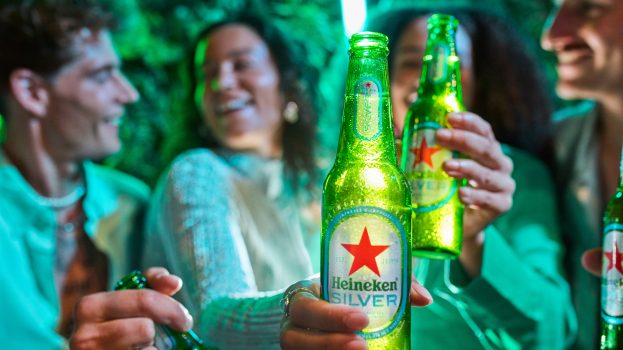
With most of its typical sampling venues remaining off-limits, Labatt built a human-powered vending machine to get people familiarized with a growing part of its beverage portfolio.
The brand’s colourful, oversized “vending machines” are not only meant to provide eye-catching photo opps for people standing inside them, but also a way for brand ambassadors to hand out samples from Labatt’s increasingly important non-beer offerings. After waiting in line on social distancing circles branded with each of Labatt’s brands, visitors in three Toronto parks could request cans from an ambassador waiting behind the glass.
The first executions of the “Bev Box” this summer drew more than 1,000 visitors, according to Brian Kuhn, VP of the “Beyond Beer” portfolio at Labatt Breweries, who says this was a first time the company has taken this kind of approach in Canada.
 Kuhn says that the brand wanted to give consumers an opportunity to trial recent product innovations in its Palm Bay vodka soda line, as well as Babe, a canned wine that has been popular on social and was recently brought to the Canadian market by Labatt. But overall, it wanted to show the different styles and varieties in its RTD portfolio, which has been a priority for Labatt and many other brewing companies looking to diversify their offerings beyond the stagnant beer category. The company also sampled mainstays in its lineup, such as Nutrl, as well as American Vintage Iced Tea and Tail Spin gin.
Kuhn says that the brand wanted to give consumers an opportunity to trial recent product innovations in its Palm Bay vodka soda line, as well as Babe, a canned wine that has been popular on social and was recently brought to the Canadian market by Labatt. But overall, it wanted to show the different styles and varieties in its RTD portfolio, which has been a priority for Labatt and many other brewing companies looking to diversify their offerings beyond the stagnant beer category. The company also sampled mainstays in its lineup, such as Nutrl, as well as American Vintage Iced Tea and Tail Spin gin.
With COVID disrupting the ability to connect with consumers during a critical time of year, the summer, Kuhn says it wanted to find a creative way to reach people, and did so with the help of agency 6Degrees, with which it has worked for a couple of years on various executions, retail programs, events and experiential marketing across multiple brands and channels.
Getting in with direct-to-consumer and sampling platforms has been one way brands have been driving sampling in a time when public safety measures limit what can be done and in-store shoppers continue to do fewer, in-and-out trips with less browsing. Kuhn says it is especially hard to drive trial for an alcohol brand, given that on-premise channels are still off-limits, which has driven an increase in on-the-street sampling.
“There is no doubt companies are looking for new ways to drive trial and awareness and the trend will continue after COVID,” he says.

Something like the “Bev Box” is a way to drive trial in an engaging, yet socially responsible way. It has not yet been marketed, with the intention being that it would is an unexpected experience people find and engage with on their own terms, Kuhn says.
“Everyone likes free stuff, but I like to think the people who waited in long lines were interested in the brands themselves,” Kuhn says, adding that the turnout it saw counters the assumption that these types of beverages mostly resonate with younger women.
Last year, Labatt did something similar as part of the “Sensorium” immersive experience, which had a human “vending machine” for the Stella Artois brand.























